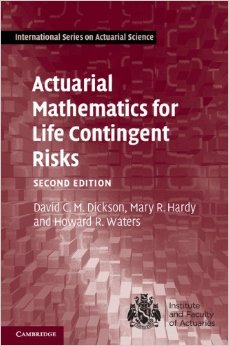Course syllabus
More details of course syllabus can be found here. Revised Syllabus
Required background
Math 3630 (Actuarial Mathematics I)
Course textbook
 Actuarial Mathematics for Life Contingent Risks, 2nd edition, by D. Dickson, M. Hardy, and H. Waters, Cambridge University Press, 2013.
Actuarial Mathematics for Life Contingent Risks, 2nd edition, by D. Dickson, M. Hardy, and H. Waters, Cambridge University Press, 2013.
Solutions manual to the 2nd edition can also be ordered here: amazon.com.
In addition, the Cambridge University Press site may provide additional resources here: Cambridge University Press.
Any possible errata on the book can usually be found here.
(Picture file of textbook was downloaded from the Cambridge University Press website.)
Course assessments
Please mark your calendar for the following course assessments:
| Quizzes | 15% | February 20 |
| Class Test 1 | 25% | February 19 |
| Class Test 2 | 25% | April 13 |
| Final Examination | 35% | to be announced |
Final examination
Final examination week for Spring 2020 semester takes place from Monday, May 4, through Saturday, May 9. Students are required to be available for their exam during the stated time. If you have a conflict with this time you must visit the Office of Student Services and Advocacy (OSSA) to discuss the possibility of rescheduling this exam.
Please note that vacations, previously purchased tickets or reservations, graduations, social events, misreading the exam schedule and over-sleeping are not viable excuses for missing a final exam. If you think that your situation warrants permission to reschedule, please contact the Office of Student Services and Advocacy with any questions. Thank you in advance for your cooperation.
Policy Against Discrimination, Harassment and Related Interpersonal Violence
The University is committed to maintaining an environment free of discrimination or discriminatory harassment directed toward any person or group within its community -- students, employees, or visitors. Academic and professional excellence can flourish only when each member of our community is assured an atmosphere of mutual respect. All members of the University community are responsible for the maintenance of an academic and work environment in which people are free to learn and work without fear of discrimination or discriminatory harassment. In addition, inappropriate amorous relationships can undermine the University's mission when those in positions of authority abuse or appear to abuse their authority. To that end, and in accordance with federal and state law, the University prohibits discrimination and discriminatory harassment, as well as inappropriate amorous relationships, and such behavior will be met with appropriate disciplinary action, up to and including dismissal from the University. Additionally, to protect the campus community, all non-confidential University employees (including faculty) are required to report sexual assaults, intimate partner violence, and/or stalking involving a student that they witness or are told about to the Office of Institutional Equity. The University takes all reports with the utmost seriousness. Please be aware that while the information you provide will remain private, it will not be confidential and will be shared with University officials who can help.
More information is available at equity.uconn.edu and titleix.uconn.edu.
Sexual Assault Reporting Policy
To protect the campus community, all non-confidential University employees (including faculty) are required to report assaults they witness or are told about to the Office of Diversity & Equity under the Sexual Assault Response Policy. The University takes all reports with the utmost seriousness. Please be aware that while the information you provide will remain private, it will not be confidential and will be shared with University officials who can help.
Academic misconduct includes, but is not limited to, providing or receiving assistance in a manner not authorized by the instructor in the creation of work to be submitted for academic evaluation (e.g. papers, projects, and examinations); any attempt to influence improperly (e.g. bribery, threats) any member of the faculty, staff, or administration of the University in any matter pertaining to academics or research; presenting, as one's own, the ideas or words of another for academic evaluation; doing unauthorized academic work for which another person will receive credit or be evaluated; and presenting the same or substantially the same papers or projects in two or more courses without the explicit permission of the instructors involved.
More information is available at sexualviolence.uconn.edu.
Academic integrity
A fundamental tenet of all educational institutions is academic honesty; academic work depends upon respect for and acknowledgement of the research and ideas of others. Misrepresenting someone else's work as one's own is a serious offense in any academic setting and it will not be condoned.
Academic misconduct includes, but is not limited to, providing or receiving assistance in a manner not authorized by the instructor in the creation of work to be submitted for academic evaluation (e.g. papers, projects, and examinations); any attempt to influence improperly (e.g. bribery, threats) any member of the faculty, staff, or administration of the University in any matter pertaining to academics or research; presenting, as one's own, the ideas or words of another for academic evaluation; doing unauthorized academic work for which another person will receive credit or be evaluated; and presenting the same or substantially the same papers or projects in two or more courses without the explicit permission of the instructors involved.
A student who knowingly assists another student in committing an act of academic misconduct shall be equally accountable for the violation, and shall be subject to the sanctions and other remedies described in "The Student Code."
Code of Conduct for candidates
This course prepares students for a professional examination administered by the Society of Actuaries (SOA) for which credit is also awarded by the Casualty Actuarial Society (CAS). Actuarial Candidates, as defined by these organizations, must adhere to the Code of Conduct for Candidates (SOA) and Code of Professional Ethics for Candidates (CAS). A copy of each has been distributed in class on the first day.